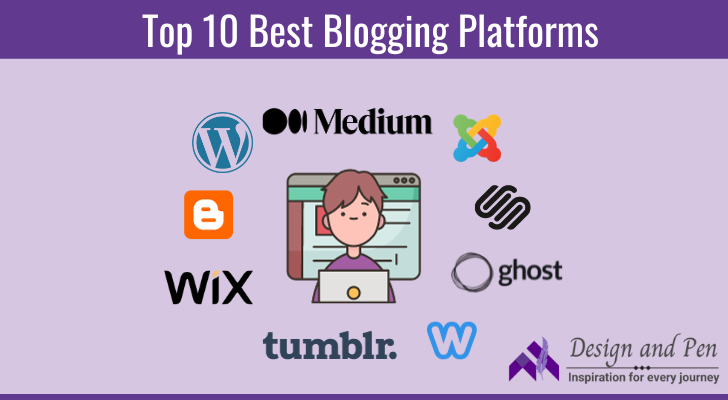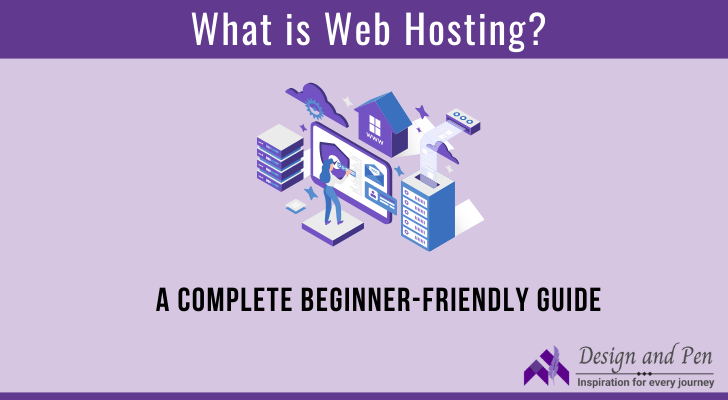What would you choose if you could choose one platform among all the best blogging platforms out there? Every newbie has a big question – How to choose the right and best blogging platform?
If you ever wanted to start a blog, you might come across many blogging platforms.
In this article, I will share some best blogging platforms in detail. If you want to start hassle-free blogging, carefully read through each.
For that, we should dive a little deeper, shall we?
Great!!
My Blog Journey in a Few Words
At first, seeing all the blogging platforms confused me. But then I understood why blogging is so popular now.
People love how flexible it is – work anytime, anywhere. No fixed schedules like jobs. It’s also great for creative writing.
For me, the main reason was my love for writing. I wanted to share life lessons through my words.
However, I also have a 9-5 job at Amazon, so I balance work life and blogging. These days, extra income is a necessity, not an option.
So, I started blogging to make more money. The best part?
It is so flexible that I can dedicate my time to writing blog posts after/before my office work. In addition, I can also work for other paid blogging sites to manage fund flow.
Nowadays, many want to start a blog—it seems easy to make money. But for beginners, choosing the right platform to match their goals is hard.
It took me time, but I finally found the perfect blogging platform. Let me tell you how I decided.

Blogging Platforms – Basic Understanding
To create and launch our blog, we need a platform to perform all the basic setup and required tasks.
There are 2 types of blogging platforms – Hosted and Self-Hosted.
Our files are stored and hosted on their server without additional charges in hosted platforms. This saves us time when learning about servers.
Examples: WordPress.com, Blogger, Tumblr, and Medium
Some platforms are user-friendly, allowing easy setup even without coding skills, and they are free or affordable.
However, some of them limit the use of external apps, premium themes, and plugins, which can restrict customization options.
In a self-hosted platform, our blog lives on our server, where we need to rent a digital storage space on the server for us by paying for the hosting.
Examples: WordPress.org, Ghost, and Squarespace.
If we host our blog using a self-hosted platform, it needs some extra work to set up. And, you also have to take a custom domain name by purchasing separate hosting.
Also, you need enough knowledge to install the software on a self-hosted platform. You should also have the skills to diagnose any issues you may encounter.
But if you’re ready with technical knowledge, you’ll have more freedom and control over your blog. You’re also not limited to using only the available features.
Now, let us see the best blogging platforms suitable for beginners. Then, I will elaborate on every option separately below so that you will get an idea of the options that are available to us.
Top 10 Best Blogging Platforms
If you need an online presence, you should have one blogging platform. With this, we can drive traffic to our blog and convert it into leads.
But choosing the wrong platform will impact us in a bad way. And, it can restrict if you want to gather leads, improve SEO, monetization options, and more.
Before considering a platform, you should consider ease of use, customization options, and cost. The best platform for you depends on your specific needs and goals.
We’ll explore some of the platforms below in detail.
1. WordPress.org – Designed for Dedicated Bloggers
This is a popular self-hosted blogging platform where we build a unique blog using WordPress.org and get more customization options.
This platform’s specialty is that you get freedom and flexibility to use its features. There are so many options to customize your blog. We get several free and premium themes and plugins.
Then, you need to install WordPress software on your own, find reliable web hosting to host your blog on your server and maintain it.
But, if you want to earn money from your blog, you can explore different monetization options and choose which suits you to make more. It even allows us to run third-party advertisements on our blog.
This is for people who are serious about their blog and want a professional appearance with complete control.
Pros, Cons, and Pricing of WordPress.org
Pros:
- You will have complete control over every part of your blog – Customization, Monetization, etc.
Cons:
- If you want to use WordPress.org, you should be ready to know a few technical aspects.
- Your technical knowledge can be useful if you get stuck in between and something goes wrong — you can deal with it without hassle.
Price:
- WordPress.org is open-source software available for free. However, if you prefer using premium templates, you should pay for a theme.
2. WordPress.com – The Ideal Blogging Platform for Beginners
With WordPress.com, we can easily create and manage our blogs without technical knowledge. The platform itself is self-explanatory and has a user-friendly interface.
It also provides us with hosting, so there is no need to go for separate hosting. You need not worry about maintaining the server. Everything is taken care of by the platform itself.
Also, compared to WordPress.org, we cannot run third-party ads here. This will reduce our monetization options, and the platform can run ads on our blogs.
So, if anyone wants to provide an ad-free blog, it is not possible.
As a beginner, if you are not willing to spend time learning technical stuff, WordPress.com is suitable for you.
Because anyone can easily design and develop a blog without any prior experience.
This is a user-friendly blogging platform for housewives who do not have enough time to take care of the back-end part of their blog.
With this, they can start a successful blog from the convenience of their home.
Pros, Cons, and Pricing of WordPress.com
Pros:
- You will get access to a community where you can get assistance on anything you need. This community is powered by WordPress.org.
Cons:
- Even if it is your blog, you will not have complete control. There are many restrictions and limitations to which we should adhere. And customization options are also fewer.
Price:
- WordPress.com has 6 plans based on your goals. You can choose one from the options below.
Free: 1 GB server space (Useful for beginners)
Personal: 6 GB space (160/- per month, if billed annually)
Premium: 13 GB space (280/- per month, if billed annually)
Business: 200 GB space (640/- per month, if billed annually)
Commerce: 200 GB space and (1152/- per month, if billed annually)
Enterprise – $25000 for the highest security standards
However, understanding the difference between WordPress.com vs self-hosted WordPress is crucial before making a decision.
3. Blogger – Google’s Reliable Option
This is one of the popular platforms for creating our blogs. Blogger is a reliable and free publishing platform powered by Google.
If you’re a newbie who wants to have a professional blog in the future. And if you are not looking to earn money yet and need some experience with writing, this is the best option for you.
Here, you can learn how to blog by writing frequent articles. You can use your Google account to create a blog without coding knowledge. Also, you will get a free domain name.
Pros, Cons, and Pricing of Blogger
Pros:
- The platform is self-explanatory and very easy to use.
Cons:
- But it has a subdomain attached to your domain name. It will be like manogna.blogger.com. By this, your domain name will not get noticed or highlighted
Price:
- Blogger is free to use.
4. WIX – Entrepreneur’s Choice of Blogging
WIX is a website builder, but it is more suitable for building business blogs. The platform takes care of every aspect of your blog.
If you’re a newbie without any technical knowledge, don’t worry. You can leave it to WIX, which will look into the back-end aspects, too.
It is also similar to WordPress, with drag-and-drop options for customizing our blog. This is mainly useful for Entrepreneurs.
Pros, Cons, and Pricing of WIX
Pros:
- You can focus more on writing content, as WIX handles everything.
Cons:
- This also has a subdomain attached to your main domain name.
Price:
WIX has many plans and options to choose from from the start. You can choose your preference below:
- Connect Domain (basic) Plan: It starts at 80/—per month and includes a free domain (Valid for 1 year), free SSL, and 500MB server space.
- Combo Plan: Starts from 125/- per month with free domain (1 year valid), free SSL, and 3GB server space.
- Unlimited Plan: Starts from 185/- per month with free domain (1 year valid), free SSL, and 10GB server space.
- VIP Plan: Starts from 325/- per month with free domain (1 year valid), free SSL, and 35GB server space.
There are 3 more plans, especially for Business and eCommerce.
- Business Basic: Starts from 225/- per month
- Business Unlimited: Starts from 300/- per month
- Business VIP: Starts from 500/- per month
5. Medium – Writer-Friendly Platform
Medium is one of the popular blogging platforms. This is more suitable for writers. Also, if anyone is writing blog articles, they use Medium as a platform to re-purpose their content.
We can also redirect our attention to our main blog using Medium. Anyone can quickly create an account in Medium with Gmail.
There is an option for Monetization here so that you can earn income by posting your articles.
As many people use this platform, you will also get to meet new people with similar interests. So that you will get a lot to learn from them and new perspectives.
Pros, Cons, and Pricing of Medium
Pros:
- In Medium, there are no customization options for themes or plugins. Taking this as an advantage, you can solely focus on creating great content without worrying about anything and distractions.
Cons:
- This platform has certain limitations and guidelines. Our article should meet these criteria before going Live, so we should share it with their staff for review.
- They will determine whether our article meets their guidelines. In this case, we cannot freely write whatever we need.
Price:
- Medium is free to use to share content. It has a membership, which is 5$ USD per month.
6. Squarespace – Versatile Platform for Bloggers of All Levels
This is also one of the top blogging platforms. Squarespace is a website builder but no coding knowledge is needed here.
Any individual, small business or large enterprise can use this platform.
As Medium, you can also create an account with simple steps. You can customize your design and content with easy drag-and-drop options.
However, for newbies, it can take time to understand and get used to the interface.
For everyone who uses Squarespace, it has a wide range of options for everyone. You need not worry about the security of your blog.
It provides us with reliable hosting and high-performance security.
Pros, Cons, and Pricing of Squarespace
Pros:
Once we design our blog here, it will automatically adapt to different devices. All its templates are mobile-responsive and hence it is easy to use on PC, mobile, and tablets.
Cons:
The plans available on this platform are a bit higher. If you’re a newbie and just starting, the cost can add up and be tight on the budget.
Price:
Check the plans and prices below:
- Personal: 16$ a month (if paid annually) with fully customizable templates.
- Business: 23$ a month (if paid annually) – Useful for people who want to grow their business by charging money.
- Commerce (Basic) – 27$ a month – you will get selling tools to help grow your business.
- Commerce (Advanced) – 47$ a month – gives all tools necessary for more advanced sellers.
7. Ghost – Best WordPress Alternative
Do not get scared by the name. Ghost is also one of the blogging platforms and is considered an alternative to WordPress.
This open-source Content Management System is also designed especially for bloggers and publishers.
Its interface is so easy to use for even a beginner blogger. Also, customization, Monetization, and speed options are similar to other platforms where you control your blog completely.
With the Ghost platform, you can invite other authors, editors, or team members to contribute and collaborate on your blog. You can assign them roles and manage their access level by limiting permissions.
Pros, Cons, and Pricing of Ghost
Pros:
Ghost has a unique feature. It uses a Markdown editor – which is a lightweight markup language.
It allows writers to focus only on content creation rather than dealing with formatting. The editor simplifies our writing process.
Cons:
The major disadvantage is that it has a complicated installation process. We need to use Ubuntu software and install Ghost by giving manual commands. This is too complex on the technical part.
Price:
Ghost has a 14-day free trial to start with.
- Starter: $11 per month ($9 if billed annually) – 1 staff user, 1 newsletter, 5 MB server space.
- Creator: $31 per month ($25 if billed annually) – all starter plan features plus 2 staff users, 1000+ Zapier integrations, unlimited custom themes.
- Team: $63 per month ($50 if billed annually) – all creator plan features plus 5 staff users, priority support, and higher usage limits.
- Business: $249 per month ($199 if billed annually) – all team plan features plus unlimited staff users, custom domains, and 99.9% uptime SLA.
8. Weebly – Effortless Drag-and-Drop Website Creator
This is a popular blogging platform and a website builder. Weebly has changed its focus to e-commerce and online shops, as this was purchased by the payment company Square.
It is also so easy to create and design with easy drag-and-drop options. We need not worry about hosting here. It provides us with free in-built hosting services.
Anyone prefers a fast, fast-loading blog, right? This has certain premium features and software that make our blog load faster.
If you want to build a straightforward and hassle-free blog, then Weebly may be the best option for you.
Other than the options provided for customization, if you want more advanced options, you might explore other platforms, too.
Pros, Cons, and Pricing of Weebly
Pros:
Weebly gives us hosting, templates, built-in features, and everything we need to create a successful blog. No need to go for separate services individually.
Cons:
This is a hosted platform. So, we will have very little control over server management and back-end changes.
Price:
It has 3P pricing plans. Below are the plans:
- Personal: 10$ per month (custom domain name).
- Professional: 12$ per month (custom domain name; more customization).
- Performance: 26$ per month (features that drive growth & manage operations).
9. Tumblr – Perfect for Microblogging
Tumblr is a micro-blogging platform that focuses on shorter content. It is also a social media website.
The same as Medium, this is used to repurpose our long blog posts by adding images, links, quotes, texts, audio, and video.
You can easily create an account using your email address and choose a theme to personalize your post appearance.
It has a mobile application that supports Android and IOS so that you can post your blog on the go.
Like other social media sites, Tumblr allows you to tag anyone so that others can see your posts, like, comment, and share. This will increase your article’s visibility and spread across the Tumblr community.
However, this is not an ideal platform for anyone who wants to write long articles and publish.
Pros, Cons, and Pricing of Tumblr
Pros:
- With Tumblr, you can get your creativity out and share any of your art, professional photos, etc.,
Cons:
- This is not suitable for professional blogging. Since it is only focused on smaller content.
Price:
- Tumblr is completely free to use. Anyone can create an account with just a few clicks.
10. Joomla – Best for Multilingual Bloggers
Like WordPress, Joomla is also an open-source solution for creating blogs of various sizes and handles complex blogs anyone can use.
Unlike other popular blogging platforms, Joomla also has a variety of themes, templates, and extensions.
With all these, we can customize it the way we want. But it requires some technical knowledge.
Joomla has a unique feature: built-in multilingual capabilities. This allows us to create and manage content in multiple languages.
This becomes a great advantage for anyone who wants to write in their native language and international creators and audiences.
Pros, Cons, and Pricing of Joomla
Pros:
- What I like about Joomla is the platform offers tutorials for every option you want. So, even a newbie will learn quickly and create a unique blog.
Cons:
- If you need to update any Joomla plugins, it may require additional attention and care.
Price:
- This platform is Free to use forever.
What is My Choice?
We’ve seen many platforms, features, pros, cons, and pricing so far. It is crucial to thoroughly evaluate all the options we have. Each one of our goals will be unique.
No need to worry about the initial hurdles that come when you start. Our needs will change over time. Hence, try to have a long-term vision, and you will end up on the right blogging platform.
Let me tell you my journey as an example to give you an idea and decide what is best for yourself.
My goal was to use my blog posts to share my learnings and life experiences with others. Eventually, I want to earn money from my blog and make it a side hustle.
Apart from that, I’m interested in UX design. Due to this, I want complete control over my blog to design and customize it the way I want and should have the option of adding new fonts and colors.
With more color options, I can use my brand colors to design my blog and its appearance.
So, with all these goals and needs, I started researching more. Each platform has its uniqueness & some offer the features I want. I want to build my brand as an authority to represent me in the long run.
This is possible only by having a unique and eye-catching domain name. After considering all the pros and cons of free vs paid blogging platforms, I decided to go with WordPress.org.
Despite the technical knowledge needed here, it gives me complete control over my blog, can design it on my own as per my needs. I can explore various monetization options.
Conclusion
We’ve finally come to an end with some exciting parts left. Which is “How to choose the right and best blogging platform” from all the above lists?
In conclusion, first, see what you and your blog want. Then decide the goals and outcomes you want your blog to give you.
There are plenty of options available. Many platforms offer us similar features.
But carefully analyze and compare individual platforms. Finally, you will arrive at the platform that is best for you.
I hope this article gave you some ideas and tips and cleared up your confusion about which platform to choose.
Start your analysis now. In the comments below, feel free to let me know which platform you’ve chosen and the reason for choosing.
I’d love to hear about your experiences too.
Happy Blogging!






Great analysis and all at a glance..
Keep up the good work🙂
Thank you all for your valuable comments and feedback.
Very easy to read. Every information needed is covered. Thank you Manogna..
Great content ya. Very thorough. Definitely would be useful for someone who wants to start the blog.
Way cool! Some extremely valid points! I appreciate you penning this article and
also the rest of the site is very good.
Thank you so much Amanita. Keep visiting Design and Pen.
Excellent blog you have here.. It’s hard to find
good quality writing like yours nowadays. I seriously appreciate individuals like you!
Take care!!